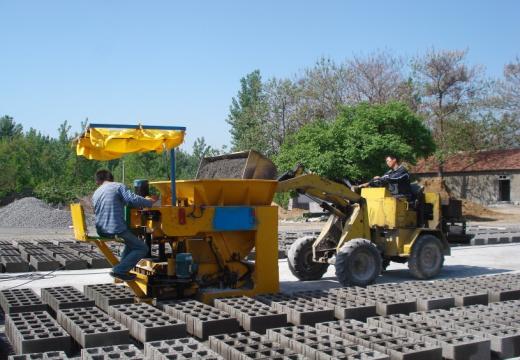10 Types Of Building Blocks Used In Construction In Ghana
10 Types Of Building Blocks Used In Construction In Ghana
- by PropHunt Admin
- On 06-03-2023
- at 11:25 AM

Ghana, a country located in West Africa, has a diverse range of building blocks used in construction due to the availability of different materials and techniques. The building blocks used in Ghanaian construction projects can be classified into ten main types, each with its unique properties and advantages.
Today, modern construction in Ghana utilizes a variety of building blocks, and each of these types has its unique properties and advantages. The selection of building blocks in Ghana is influenced by factors such as availability, cost, durability, and intended use.
The most common building blocks used in Ghanaian construction projects can be categorized into ten main types. These include clay bricks, concrete blocks, concrete blocks, autoclaved aerated concrete (AAC) blocks, compressed stabilized earth blocks (CSEBs), pavement blocks, glass blocks, and wood blocks.
Types Of Building Blocks In Ghana
Each type of building block used in Ghana has its unique benefits. For example, clay bricks are preferred for their durability, thermal insulation, and low cost, while concrete blocks are popular for their strength, fire resistance, and sound insulation.
- Clay Blocks: Clay blocks are made from locally sourced clay and are used extensively in rural areas of Ghana. They are cheap, durable, and can be easily molded into various shapes and sizes. They are popularly used for their durability, thermal insulation, and low cost
- Sandcrete Blocks: Cement blocks are made from a mixture of cement, sand, and water. They are widely used in urban areas of Ghana due to their durability and strength. They come in different sizes and shapes, including solid and hollow blocks.
- Laterite Blocks: Laterite blocks are made from a mixture of laterite soil and cement. They are widely used in the northern regions of Ghana because of their availability and low cost.
- Compressed Earth Blocks (CEB): CEBs are made from a mixture of soil, cement, and water. They are eco-friendly and have excellent thermal insulation properties, making them suitable for building homes in hot and arid regions of Ghana.
- Concrete Blocks: Concrete blocks are made from a mixture of cement, sand, and water. They are widely used in Ghana for building walls, foundations, and retaining walls due to their strength and durability. They are preferred for their strength, fire resistance, and sound insulation.
- Cob Blocks: Cob blocks are made from a mixture of soil, sand, straw, and water. They are eco-friendly and have excellent thermal insulation properties, making them suitable for building homes in hot and arid regions of Ghana.
- Autoclaved aerated concrete (AAC) blocks: AAC blocks are made from a mixture of cement, lime, sand, and water, and they are known for their lightweight, thermal insulation, and soundproofing qualities.
- Compressed stabilized earth blocks (CSEBs): CSEBs are made from soil, stabilized with cement, and compressed into blocks. They are preferred for their low cost, eco-friendliness, and ease of production.
- Red bricks: Red bricks are made from clay and are known for their durability, thermal insulation, and aesthetic appeal.
- Pavement blocks: Pavement blocks are used in Ghana for paving walkways, driveways, and other outdoor spaces. They are made from concrete and come in various sizes and shapes.
Overall, the choice of building blocks in Ghana depends on several factors, including availability, cost, durability, and the intended use of the building.
6 Inches Block Price in Ghana and Standard Block Sizes
If you're planning to build a house in Ghana, one of the essential materials you'll need is blocks. Blocks are an integral part of any building project, and finding the right size and price is crucial. Before you build you need to know about 6 inches block price in Ghana, the block factory in Accra, the block size in Ghana, and the standard block size in Ghana.
Block Size in Ghana
Blocks are made in different sizes and shapes, and the size you choose depends on the building's design and specifications. In Ghana, the most common block sizes are 4 inches, 5 inches, and 6 inches. The 6 inches block is the most popular size used for building walls, and it is the size we will focus on in this article.
Standard Block Size in Ghana
The standard size for a 6 inches block in Ghana is 18 inches by 6 inches by 6 inches. This size is widely used in the construction industry, and it is the most commonly found block size in block factories across the country.
6 Inches Block Price in Ghana
The price of 6 inches blocks in Ghana varies depending on the location and the supplier. In Accra, the capital city of Ghana, the price of a single block ranges from GHS 2 to GHS 3.50. The cost may be higher or lower in other parts of the country, depending on the cost of production and transportation.
Block Factory in Accra
If you're looking for a block factory in Accra, there are several options to choose from. Accra's most popular block factories include Adom Blocks Factory, Asanduff Blocks Factory, and Buoho Bricks Company. These factories offer a range of block sizes and shapes, including the 6 inches block size.
Conclusion
When it comes to building in Ghana, blocks are an essential part of the construction process. Knowing the standard block size and 6 inches block price in Ghana is crucial for anyone planning to build a house or any other structure.
Block factories in Accra offer a range of block sizes and shapes, making it easy to find the right blocks for your project. With this comprehensive guide, you're well-equipped to make informed decisions about the blocks you need for your building project.
Overall, the use of building blocks in Ghanaian construction projects is a reflection of the country's diverse range of materials and techniques. The choice of building block depends on the specific needs of each project, as well as the cost and availability of materials.

 French
French




